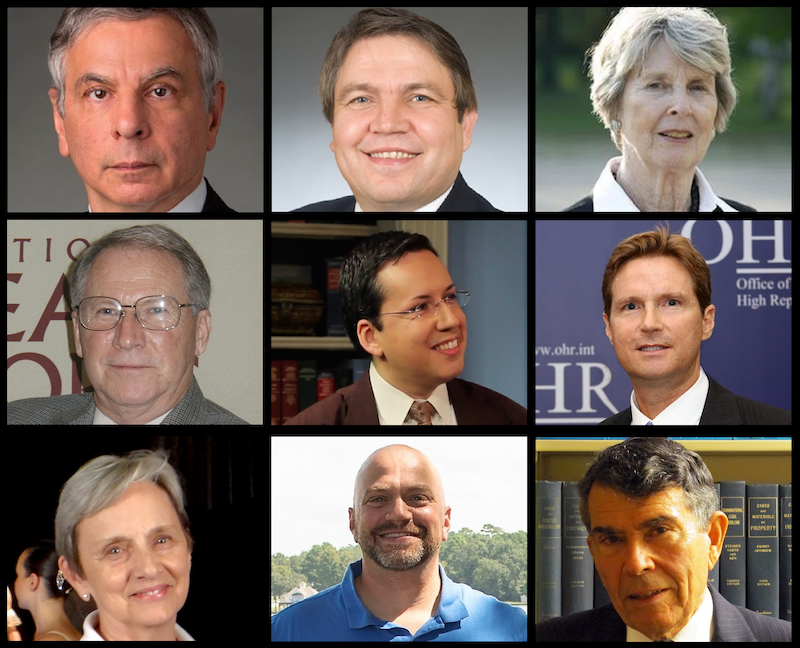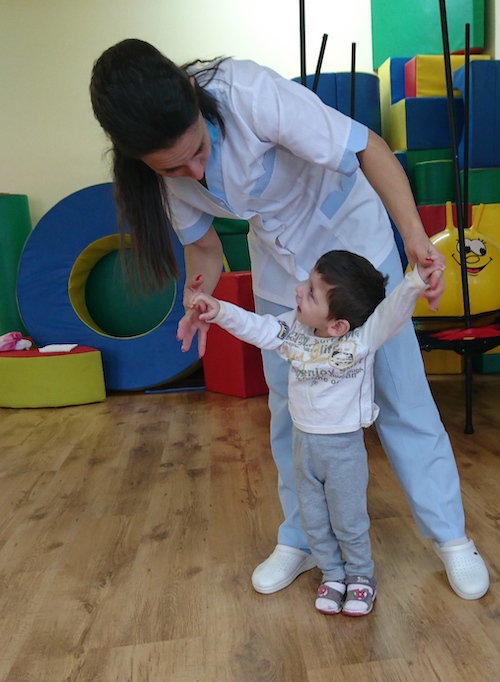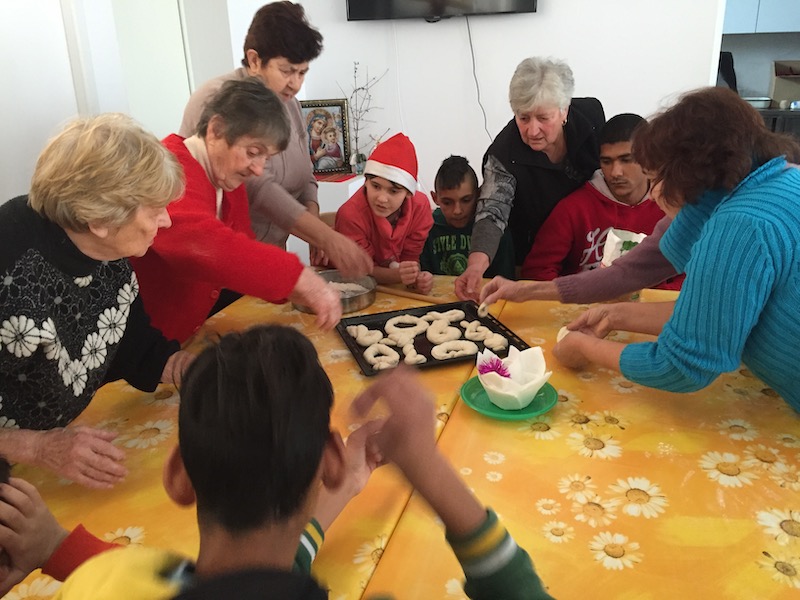
The Bulgarian-American Society (BAS) has no headquarters, paid employees, or operating budget, its web presence is modest and its name fairly unknown. But for hundreds of Bulgarians, it has meant the difference between despair and hope, gloom and cheer, a dead end and opportunity.
Since its founding in 1991, the Society has provided both emergency funding and regular support to individuals and organizations across Bulgaria. It has helped repair collapsing roofs, supported the purchase of medical equipment for hospitals, and supplied textbooks for students who couldn’t otherwise afford the expense. Moreover, eleven organizations that are the sole providers of vital services in remote communities throughout Bulgaria have benefited from continued BAS support for more than a decade.
Most crucially, the Society’s academic scholarships have helped nearly 1,000 young Bulgarians transition from institutional care to lives of professional and personal fulfilment. Some have turned their lives around completely and even gone on to achieve remarkable success. A young woman who grew up in an orphanage became a social worker and an inspiration to other orphans. The Society’s support prepared a young man for the academic challenges of one of the country’s top agrarian universities. A multi-year scholarship allowed another young man to create a better life for himself and a younger sibling. Today, the older brother is a hardware engineer at one of Europe’s leading automotive companies.

These inspiring stories are made possible by an equally inspiring volunteer effort—by Bulgarian expats and Americans working together to ensure Bulgaria’s underprivileged get a fair chance in life. BAS members include high-ranking US diplomats and Bulgarians with successful careers in the United States, among them a former US ambassador to Bulgaria, an ambassador’s spouse, a Peace Corps country director, a Financial Times and Washington Post correspondent, and high-powered lawyers. They take time out of their busy lives to seek out and empower dependable Bulgarian civil society organizations serving orphans, senior citizens, and other vulnerable individuals in the hope that they can make their lives a little better. What unites these individuals is dear memories of Bulgaria, good friendships they left behind, and a refusal to move on when so many in the country need help.
Jeff Ploetz and Rod Moore are the most recent recruits to the Society’s cause. As BAS board members and the organization’s executive director and treasurer, respectively, they are tasked with taking the cause into its fourth decade.
They may be new to BAS, but their connections to Bulgaria go back decades. Jeff Ploetz first came to Bulgaria with the Peace Corps in 1997 and stayed connected over the years through the Friends of Bulgaria, an organization he cofounded to fundraise for local projects. Mr. Ploetz is a Bureau Environmental Officer with the US Agency for International Development.
Rod Moore studied Bulgarian in college and lived in Bulgaria on three separate occasions. He stays in touch with his Bulgarian friends and through his personal giving supports a variety of initiatives in the country. A retired Foreign Service Officer, he teaches courses on diplomacy at the McCain Institute of International Leadership. Mr. Moore was elected to the ABF Board of Directors in December 2020.

We spoke to Mr. Ploetz and Mr. Moore about the Society’s work and their own enduring connections to Bulgaria.
America for Bulgaria Foundation: How did the Bulgarian-American Society come about, and what does it do?
Jeff Ploetz: I like to think of the Bulgarian-American Society as an evolving story. Chapter 1 covers our founding. It was in 1991, and during its early days BAS worked closely with the Bulgarian Embassy in Washington, DC. The founders initially established our organization in hopes of addressing humanitarian pleas for assistance received by the Embassy, but funds were short. In the early years BAS also served as a means for sharing Bulgarian music and dance with the US.
BAS entered a dormant phase for a few years until Chapter 2, during which BAS was reborn under Meryl Steigman’s, Sol Polansky’s, and Stanimir Alexandrov’s leadership. This is where I feel our story begins. It was at this time that the stars aligned, our vision and mission solidified, and BAS received a generous donation from the Tianaderrah Foundation. Since that day, our commitment has been to support honest nonprofit organizations working in Bulgaria to make a positive impact in the lives of youth and underprivileged segments of society. Until her passing in 2017, Meryl Steigman served BAS as executive director helping to guide operations and support our grantees.
We are a modest organization, run completely by volunteers. BAS has never had a large donor base, and our grants program is largely supported by two very generous benefactors. This brings us to our current chapter. I was recruited in 2018 by my former Peace Corps country director, Ken Hill, to be the executive director. Our treasurer, Meryl’s husband, Andrew Steigman, died that year as well.
Which brings us to Rod joining. We, along with our Board of Directors, understand that, to ensure BAS has a sustainable future, we need to expand our donor base. We know we can do more, support more trustworthy and honest organizations who are working to address the needs of the underprivileged in Bulgaria. At the same time, we know the Bulgarian diaspora and the 1,000+ returned Peace Corps volunteers and many other Americans who, like me, fell in love with Bulgaria would love a way to give back at a grassroots level.
We are truly grassroots and all volunteer, 100% of donor funds reach our grantees, and our commitment remains to support organizations working in Bulgaria to improve life for the country’s worst-off individuals.
Each year we give what we take in, and there is always a need for more, more we can do, more we can help with. Especially this year. This was the first year I had to say, “Sorry, here is what we can support. If we manage to raise additional funds, we will send more.” COVID-19 is hitting Bulgaria hard, and those most at risk are our target beneficiaries.
ABF: What are the specific needs the Bulgarian-American Society addresses in Bulgaria?
Jeff Ploetz: Much of our annual giving is in support of vulnerable youth or youth growing up in institutions, mostly in the form of scholarships. We also support several school programs, textbooks, and support services. This year we also supported the purchase of laptops to enable remote learning during the pandemic. We also support teacher education, food assistance, and cultural events. Some of my favorite programs help to bridge generations, pairing orphans with the elderly. Then there is the work of the physiotherapists we support providing handicapped children with the therapy they need. At the end of the day, we support our trusted grantees with the programs that they have developed to address their community needs.
ABF: How does BAS fund its annual giving? Can an organization run solely on the enthusiasm of generous individuals and volunteers?
Rod Moore: Until now, BAS funding has come entirely from generous individual donors, including several benefactors who renew their donations every year. As Jeff mentioned, we would, of course, welcome contributions from individuals, organizations, corporations, or other institutional entities as well.
We take great pride in the fact that 100% of donations we receive reach our beneficiaries in Bulgaria. How do we achieve that? Well, we have almost zero overhead. Everyone associated with BAS is an unpaid volunteer; BAS maintains no offices or equipment; and BAS board members themselves cover the minimal administrative expenses (website hosting, registration, etc.) that arise from time to time.
Because BAS is a 501(c)(3) entity, donations to it are tax deductible under US law.




ABF: Who are your grantees?
Jeff Ploetz: We are approaching 1,000 supported students over the past ten years. We have also supported eleven organizations, but we have six that are routinely supported. Having a love of Geographic Information Systems, I would like to map the extent of our reach and the communities we have touched. To date, I could not say definitively, but from our grantee annual reports, our funds have reached hundreds of individuals in Sofia, Vratsa, Roman, Samokov, Pleven, Kotel, Tryavna, Plovdiv, Blagoevgrad, Montana, Sliven, Varna, Razgrad, Stara Zagora, and Veliko Tarnovo.
ABF: What grantee stories have stuck with you?
Rod Moore: Virtually all of them. What I like most about BAS is that its programs directly and palpably touch the lives of real people—people for whom a little help can make a huge impact.
Jeff Ploetz: The letters we receive from scholarship recipients are very touching. I am very fond of them all, but I have a soft place in my heart for the projects that are helping to bridge generations. Those that bring together orphans and pair them with Babas or those that bring together orphans and the elderly to celebrate together national holidays and other significant dates. They sing songs, cook together, organize literary readings, and plant flowers.
ABF: Both of you virtually started your careers in Bulgaria. How have those first experiences shaped you, and how did your connections to the country evolve over the years?
Rod Moore: There is no one place (other than Washington) in which I have spent more time as an adult than Bulgaria. In fact, my association with Bulgaria dates back 35 years—to when I first began studying the language in college. That and a post-graduation visit to Bulgaria in the 1980s got me hooked! Later, when I joined the Foreign Service, I had three opportunities to serve at the US Embassy in Sofia: from 1990–1992, from 2000–2003, and in 2015. These were all monumental periods in Bulgaria’s modern history, and I consider myself deeply privileged to have been able to observe how profoundly Bulgaria has transformed over the decades. Bulgaria will always be a special place for me.
Jeff Ploetz: In June of 1997, my wife and I arrived in Bulgaria as Peace Corps volunteers. We were newlyweds, and we were ultimately assigned to Gabrovo as Ecolog volunteers. We often refer to it as our two-year honeymoon. I worked with Central Balkan National Park, my wife with the local schools. We also worked with the local YMCA and on occasion with the local orphanage. A very fond memory was when we took a group from the orphanage to the movie theater in 1998 to see Mulan. Such a common thing for many was so special for them! We lived in Bulgaria for just over two years. Exploring as much of the beautiful country as possible, we became enamored of it. We were fascinated by the history, and we made many dear friends. When we returned to the US, I along with some other returned volunteers wanted to continue to give back, so we formed the Friends of Bulgaria, and for years we were able to bring folks together and raise a little money to support Peace Corps volunteer projects. Fast forward 15 years, I get an email from Ken Hill, my old country director, asking if I might be interested in working with him again to support this fine organization. I didn’t have to give it much thought!






ABF: Why do you volunteer your time to the Bulgarian-American Society?
Rod Moore: Having spent so much time in Bulgaria, I have developed a great affection for the country. After retiring from the State Department, I wanted to find a way to stay engaged and help out. That desire led me to BAS, whose commitment to supporting the neediest groups in Bulgaria is very appealing to me. I currently serve on the BAS Board and as the organization’s treasurer.
Jeff Ploetz: I joined BAS as our executive director in April 2018 as I mentioned. My experience in Bulgaria shaped my life to this very day. Where I sit now in my professional life can be traced back to my assignment with Central Balkan National Park. When presented with the opportunity to give back, I didn’t have to think twice. Why do I volunteer my time? It is a fair question. Giving is part of my DNA; it provides me a sense of satisfaction and peace knowing I am doing something to help make the world a bit better. I know it is cliché, but it’s the truth.
ABF: How can others support the work of BAS?
Rod Moore: Regardless of your background, contributing to BAS is a great, simple, effective, and tax-deductible way to get meaningful help to people in Bulgaria who really need it. We take donations of any scale, and we will ensure that 100% of those funds reach our partners in Bulgaria.
Jeff Ploetz: Rod said it well. So many in Bulgaria, like many other places, are hurting and/or just need a little extra help. Having the means to give back, be it $50 or $100,000, each dollar we receive translates to direct impacts on the ground. 100%. It’s that simple.
To contact the Bulgarian-American Society, donate, or apply for a grant, please visit their website.

